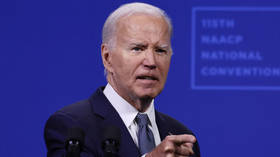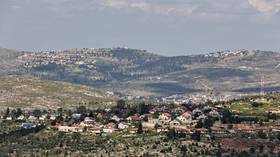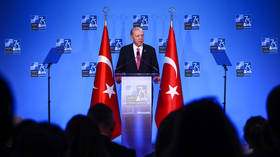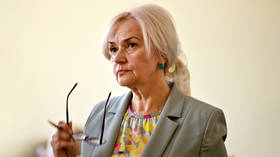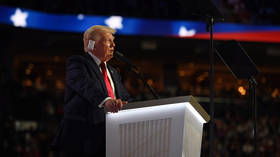‘One day it will need to go’: Hamas opponent tells RT about his fight for Gaza’s future
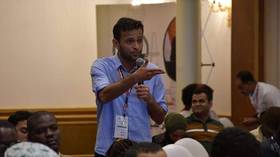
In June, the Palestinian Centre for Policy and Survey Research released the results of a poll, showing a growing support for Hamas, an Islamic movement that has controlled the Gaza enclave since 2007.
According to their survey, 67% of those asked – both in the enclave itself and the West Bank – supported Hamas’ decision to launch its deadly attacks on Israel last October 7. 61% of respondents said they would like Hamas to govern Gaza after the war was over.
But does this data reflect the reality on the ground? RT talked about it to Rami Aman, a social activist and a native of Gaza, who has been declared a ‘prisoner of conscience’ by Amnesty International.
Fading Support
“It is the media that creates this illusion that Hamas is getting stronger - and Hamas exploits it. Of course, they do have their supporters in Gaza but the truth is that since the beginning of the war and even earlier they have only been losing support among the masses”, Aman claims.
Since the start of the current conflict, Israel pounded the Strip with tons of explosives. More than 38,000 people – mainly civilians – have died in the process, according to the Gaza Health Ministry. Infrastructure has been destroyed, many cities damaged beyond repair.
While Gazans hold Israel responsible for their suffering, many have also pointed a finger of blame at Hamas and social media has been packed with videos where Gazans condemn the group quite openly. Many no longer mince words when it comes to the movement, some have even started to name their donkeys after the leaders of the organization, to show their disdain to those top officials.
Seeds of Change
Aman was one of the very first people who started this resistance to Hamas. For him, the rejection of the group began in 2009 during Israel’s operation Cast Lead.
Back in those days Aman was working as a news producer, covering the war, Hamas’ activity and the funerals caused by Israeli shelling.
“I remember that Hamas was celebrating the killing of our people, and I thought to myself that if they have no problem to lose 400 people, they will not cry losing hundreds and thousands more”.
Already in 2009, Aman wanted to make a change but an opportunity arose only two years later, in 2011, when the region was swept by anti-government mass demonstrations of the Arab Spring. It was then when groups of young people in the strip of land, including Aman, took to Facebook and called for Gazans to take to the streets on March 15. Their demand was simple: they wanted to see the end of divisions between the various Palestinian factions and they called for elections in Gaza and the West Bank.
“Back then we distributed many posters and leaflets, glueing them on walls, distributing them among people, sticking them onto cars. We were engaged in this activity day and night, and I remember that we managed to gather large crowds of youngsters, students from different backgrounds, families, business people. On March 15 thousands took to the streets, demanding a change.”
Hamas, however, had no intention of seeing this happen. Since the morning and throughout the entire day, security forces of the group cracked down on protesters, confiscating their banners, beating some and arresting others. They set their tents ablaze, fired into the air and eventually dispersed the crowds. Quiet has been restored, any political movements that dared to challenge Hamas were banned, students’ activities on campuses have been restricted. But Aman admits that that attempt to silence him has only strengthened his will to continue the fight.
Since then, he and his think-alikes organized many anti-Hamas protests. Some of them aimed at improving the living conditions of Gazans, others rejected political arrests, demanded fair and transparent elections, called to end internal disputes and even urged to normalize relations with Israel.
One of the bigger protests took place in 2017 when more than 100,000 Gazans came out urging Hamas to solve the enclave’s electricity crisis. Another major demonstration was arranged in March 2019, where mobs demanded that the group improve their living conditions, reduce taxes and lower food prices. Then came Covid-19 and the banning of mass gatherings but, in 2023, demonstrations started to re-emerge, with people venting anger at their dire economic conditions, the raging poverty and the high unemployment rates.
Hamas, says Aman, was anxious; political arrests and executions – that have been regular in the past – have become even more frequent.
Aman felt Hamas’ repressions on his own skin. He says he cannot count the amount of times he has been detained, arrested, beaten and jailed throughout his years of social activism. Sometimes the detentions were short. On other occasions, he spent long months in prison. In 2021 he had enough. Shortly after another release he packed his bags and left for Cairo where he resides today, away from the turmoil of the Gaza war. But many family members and friends are still in Gaza, and so is his heart.
“I will never stop fighting for the future of Gaza,” said Aman. “We were the seeds of the movement that wanted a change because Hamas doesn’t care about Gazans, it cares only about itself. I believe that a change is still possible. Maybe not now but Hamas was elected for four years, not forever. One day it will need to go,” the activist concluded.
Hamas took control over Gaza in 2007 after it ousted from there the officials of Fatah, its main rival. As a result, the divide between the two factions, wide even before the confrontation – grew wider, impeding elections. Throughout the years there have been a number of internal and regional initiatives that tried to promote reconciliation but those have never brought about a change.






